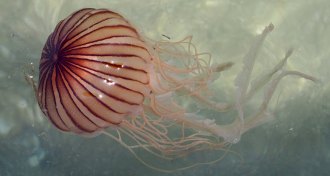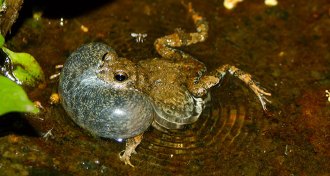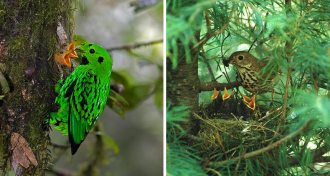Animals
-
 Animals
AnimalsRabbits leave a mark on soil long after they are gone
Twenty years after rabbits were removed from a sub-Antarctic island, soil fungus has yet to return to normal, a study finds.
-
 Animals
AnimalsSame math describes relationship between diverse predators and prey
From lions to plankton, predators have about the same relationship to the amount of prey, a big-scale ecology study predicts.
By Susan Milius -
 Paleontology
PaleontologyNew dolphin fossil makes a splash
A newly discovered dolphin fossil provides clues to the evolution of river dolphins in the Americas.
-
 Paleontology
PaleontologyNew dolphin fossil makes a splash
A newly discovered dolphin fossil provides clues to the evolution of river dolphins in the Americas.
-
 Animals
AnimalsSome jellyfish sting deeper than others
A new study shows that some jellyfish have nematocysts that can sting deep into the skin. That may explain why their sting is so painful.
-
 Animals
AnimalsCoral competitor becomes ally in fight against starfish
On the reef, algae compete with coral. But they may also protect coral from attacks by crown-of-thorns starfish, a new study finds.
-
 Animals
AnimalsDecoy switches frogs’ mating call preference
A female túngara frog may switch her choice between two prospective mates when presented with a third, least attractive option.
-
 Animals
AnimalsTropical songbirds get their growth spurt late
Tropical songbirds are late bloomers, but that delayed development may give them an advantage after leaving the nest.
-
 Animals
AnimalsTropical songbirds get their growth spurt late
Tropical songbirds are late bloomers, but that delayed development may give them an advantage after leaving the nest.
-
 Humans
HumansMoon bounces, bad spider leaders and more reader feedback
Readers debate faith's role in evolution, compare politicians to spiders and more.
-
 Animals
AnimalsTwin pandas look forward to growth spurts
The surviving panda twin born at the National Zoo last weekend will undergo DNA tests to discover paternity.
By Meghan Rosen -
 Animals
AnimalsA world of mammal diversity has been lost because of humans
Humans have eradicated large mammal biodiversity in most regions of the globe, a new study finds.